AI In Recruiting Automation: Benefits, Tools, And How To Start
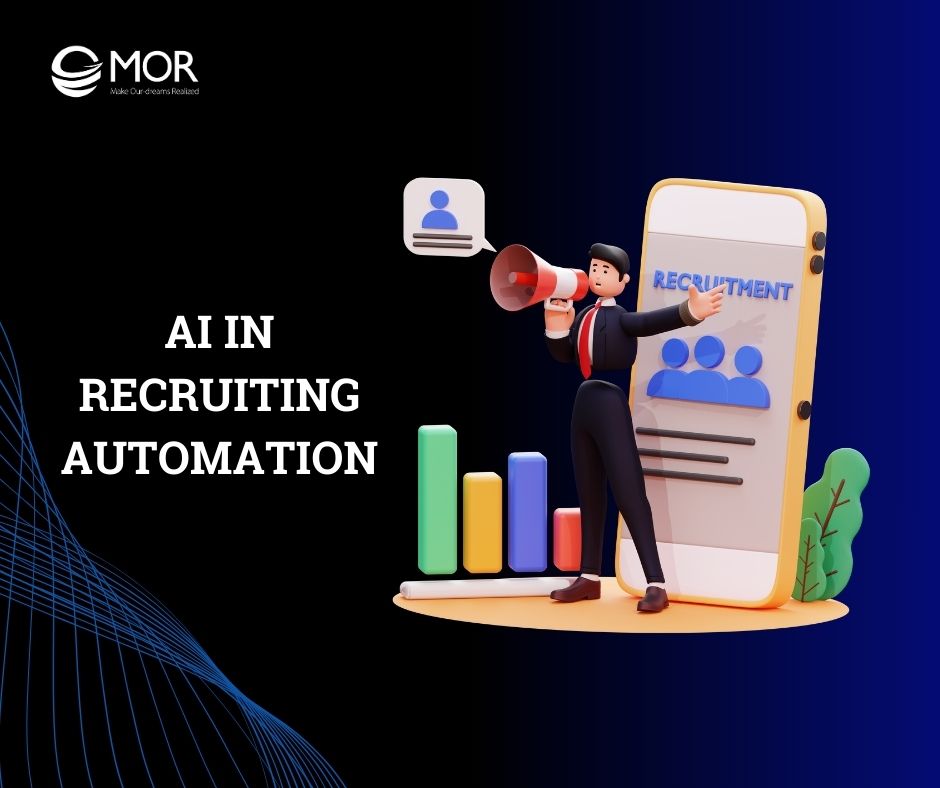
Is your business struggling to optimize hiring processes and attract top talent effectively? Implementing AI in recruiting automation can transform the entire recruitment workflow. In this article, MOR Software will introduce information about these solutions that help businesses enhance hiring efficiency and strengthen their competitive edge in the talent market.
What Is AI In Recruiting Automation?
AI in recruiting automation uses artificial intelligence to automate and improve the hiring process. It screens resumes, matches candidate skills to job requirements, and predicts future job performance using data-driven models. These systems conduct video interviews, rank applicants through machine learning algorithms, and handle thousands of applications at once, identifying the strongest candidates faster and more accurately.
Through combining natural language processing, predictive analytics, and automated decision-making, AI recruitment transforms traditional hiring into a data-centric process. Modern platforms integrate seamlessly with applicant tracking systems, job boards, and HRIS tools, providing a unified hiring experience. Machine learning models continue learning from successful hires, refining how well they match candidates to future roles over time.
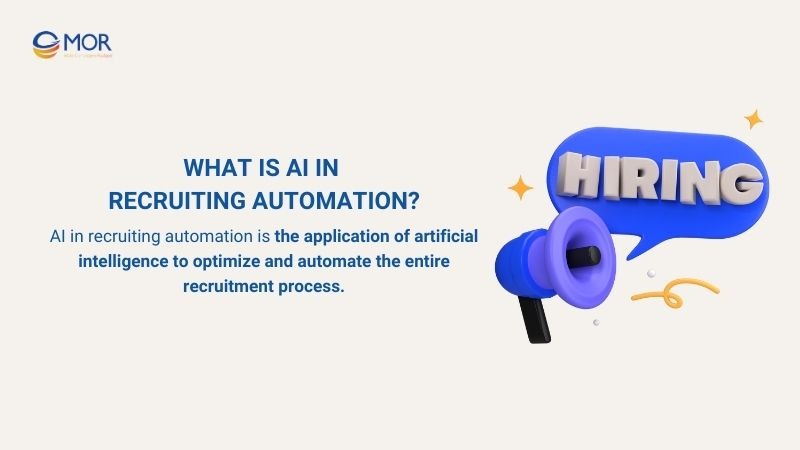
Key AI Applications In Recruiting Automation
The implementation of AI in recruiting automation has become a crucial factor in improving the entire recruitment process. Below are some key applications to enhance the overall candidate experience.
AI-based Automation
One of the most important applications of AI in recruitment software is automating repetitive recruitment tasks, including scheduling interviews, sending candidate reminder emails, updating candidate statuses, and managing communications. This helps HR save time, reduce manual errors, and ensure the recruitment process runs smoothly and efficiently.
For example, the HR team at TechNova, a technology company, applies AI in recruitment software to manage the interview process for 150 candidates per month. Workflow:
- AI automatically syncs candidate profiles from emails, ATS, and online application platforms.
- Based on HR and candidate availability, AI creates suitable interview slots.
- Emails and messages are automatically sent to candidates and HR before interviews.
- Interview results are updated in the system and notifications are sent to HR.
Candidate Sourcing
Finding the right candidates from multiple sources is a major challenge, especially for global recruitment. AI in talent acquisition automatically analyzes profiles from online job platforms, social media, internal databases, and global candidate records.
For example, BellaCare, a cosmetics company, uses AI in recruiting to source candidates for global marketing manager positions. Workflow:
- AI scans profiles from LinkedIn, Facebook, specialized job boards, and internal databases.
- Filters candidates based on skills, experience, and cultural fit.
- Ranks candidates according to their suitability for the role.
- HR receives a list of qualified candidates for the next steps in the interview process.
This enables HR to save time, expand the talent pool, and increase the likelihood of hiring high-quality candidates.
Resume Screening
Manual resume screening is time-consuming and prone to errors. AI in recruitment process automatically scans resumes, evaluates skills, experience, degrees, and certifications, and ranks candidates based on job-fit.
For example, FinPro, a financial company, hires 400 employees annually and uses AI in recruitment process:
- AI scans all online applications.
- Identifies mandatory criteria and additional skills.
- Ranks candidates based on suitability.
- Sends filtered resumes to HR for interviews.
Chatbot Interactions
Personal interaction with candidates, especially in the early recruitment stage, is time-intensive. AI in recruiting automation uses chatbots to automatically answer FAQs, guide application completion, provide recruitment information, and schedule interviews 24/7.
For example, GreenTech, a technology company, implements AI for recruitment:
- Chatbots respond to common candidate inquiries.
- Guide candidates to complete applications and select interview times.
- Send automated reminders before interviews.
- Record feedback and evaluate candidate experience.
Predictive Analytics
AI based hiring uses predictive analytics to assess candidate-job fit based on historical data, skills, experience, and previous evaluation results.
For example, the HR team at FastMove, a logistics company, applies predictive AI for operations staff:
- Analyze past candidate data and job performance.
- Predict the likelihood of success for new candidates.
- Rank candidates by suitability and send the list to HR.
Skill Assessment
Candidate skill assessment is a crucial step. AI in recruitment software supports online skill tests, video interview analysis, and soft skills evaluation, helping HR select the most suitable candidates accurately.
For example, SoftWave, a software company, hires programmers using AI:
- AI sends online skill assessments.
- Automatically analyzes results.
- Evaluates video interviews for soft skills.
- Ranks candidates and provides detailed reports to HR.
Diversity and Inclusion
To reduce bias, AI for recruitment and AI in talent acquisition ensure candidate evaluation is based on skills and competencies rather than personal information.
For example, GlowBeauty, a cosmetics manufacturer, implements AI:
- Removes sensitive personal data from candidate profiles.
- Evaluates based on skills and experience.
- Provides HR with a diverse list of qualified candidates.
Candidate Experience Enhancement
A smooth candidate experience increases acceptance rates and helps retain talent. AI in recruiting and AI for recruitment personalize candidate engagement through automated status updates, chatbot assistance, and interview reminders, ensuring candidates feel valued.
For example, FinElite, a financial company, applies AI:
- Automatically sends recruitment status updates.
- Chatbot answers candidate questions and provides guidance.
- Monitors candidate experience to improve the process.
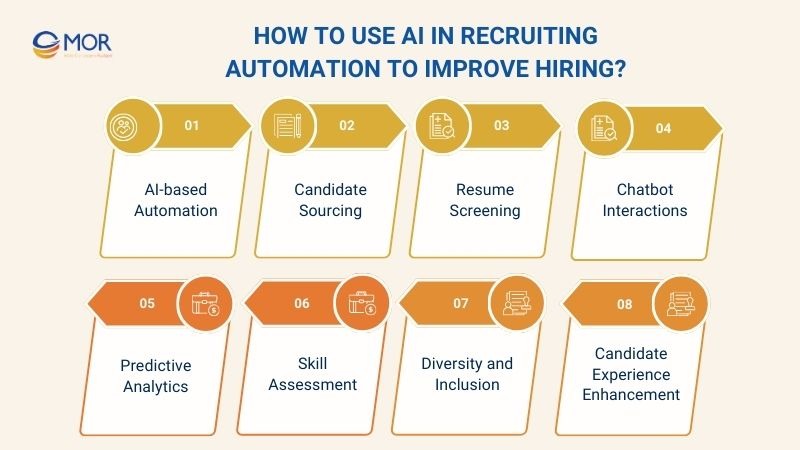
Key Benefits Of AI In Recruiting Automation Process For HR Teams
The implementation of AI in recruiting automation enhances the entire recruitment process. It also serves as the foundation to explore detailed benefits that improve the candidate experience throughout the hiring journey.
Objective Evaluation
AI in recruitment helps automate repetitive tasks like resume screening and initial candidate evaluation, saving recruiters significant time and effort. Instead of replacing human judgment, AI supports it by providing data-driven insights about each applicant’s skills, experience, and potential fit.
This approach allows HR teams to focus more on meaningful candidate interactions and strategic hiring decisions. It also brings greater consistency and transparency to the process, reducing the influence of unconscious bias rather than eliminating it entirely.
Enhanced Candidate Source
In many organizations, finding suitable candidates is often limited by traditional recruitment channels and internal networks. This makes it difficult for HR to access diverse talent pools, especially high-potential candidates outside their usual reach.
AI in recruiting addresses this challenge by analyzing data from multiple sources, including social media, online job platforms, internal databases, and global candidate profiles. This enables HR teams to identify high-quality candidates more effectively and expand access to diverse talent, improving overall recruitment outcomes.
Time and Cost Savings
67% of recruiters report that AI helps save time during the hiring process. Repetitive recruitment tasks such as resume screening, sending reminder emails, scheduling interviews, or updating candidate data often consume significant time and resources for HR teams.
AI in recruitment software can automate all these steps, reducing manual workload and ensuring accuracy throughout the process. By shortening time-to-hire and lowering operational costs, HR can focus on strategic tasks like conducting high-quality interviews and enhancing the candidate experience.
Data-Driven Insights
With AI based hiring, systems can predict candidate-job fit based on resumes, skills, experience, and prior evaluation results. These analytical reports help optimize recruitment strategies, identify effective channels, reduce mis-hires, and improve the overall quality of incoming candidates.
Personalized Engagement
A crucial factor in the candidate experience is timely and personalized interaction. However, HR often struggles to maintain continuous communication with hundreds of applicants. AI in recruiting supports automated communication via chatbots, smart emails, and reminder systems while maintaining personalization.
41% of companies have implemented AI-powered chatbots to engage candidates during early recruitment stages, answer common questions, and schedule interviews. Thanks to AI for recruitment, every candidate receives quick responses, detailed updates on their application status, and necessary guidance.
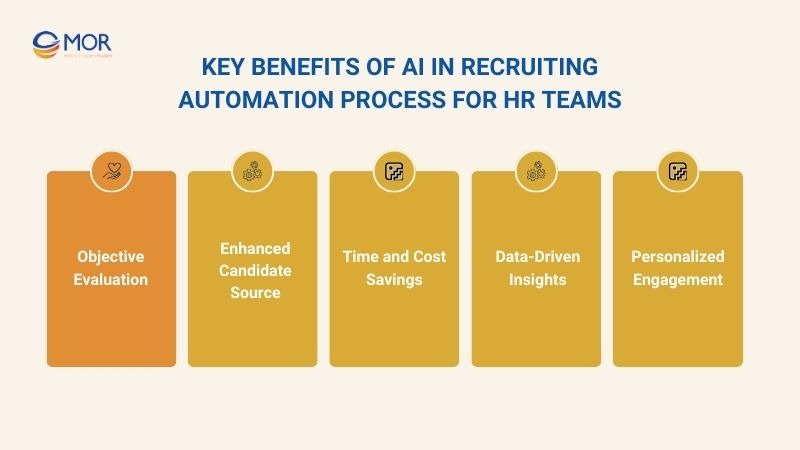
Best 7 Tools Of AI In Recruiting Automation You Should Know
AI in recruiting automation tools are increasingly essential for HR teams, helping optimize the entire recruitment process. Here are the 7 best AI in recruitment tools that HR professionals should know to enhance hiring efficiency and make smarter, data-driven decisions.
Vervoe
Vervoe is an AI-driven skill assessment platform designed to evaluate candidates' abilities through real-world tasks. By focusing on performance-based evaluations, Vervoe helps organizations identify top talent efficiently.
Strengths:
- Comprehensive Assessment Library: Offers over 300 pre-made skill tests covering both technical and soft skills, enabling thorough candidate evaluations.
- Bias Reduction: Utilizes AI to rank candidates based on performance, minimizing human biases in the hiring process.
- Collaborative Tools: Provides features for sharing and comparing candidate assessments, facilitating team collaboration in hiring decisions.
Weaknesses:
- Initial Setup Time: Customizing assessments to align with specific job requirements may require additional time.
- Learning Curve: New users might need time to familiarize themselves with the platform's features and interface.
Ascendify
Ascendify is an AI-powered HR recruitment platform that streamlines sourcing, screening, and scheduling processes. It integrates seamlessly with existing ATS systems, enhancing recruitment efficiency.
Strengths:
- Unified CRM and Recruitment Marketing: Combines CRM functionalities with recruitment marketing tools to build and maintain candidate relationships.
- AI Talent Matching: Leverages AI to match candidates with suitable roles, improving the quality of hires.
- Seamless Integration: Easily integrates with existing Applicant Tracking Systems (ATS), ensuring a smooth transition and adoption.
Weaknesses:
- Complexity for Small Teams: The platform's comprehensive features may be overwhelming for smaller recruitment teams.
- Cost Considerations: Advanced features may come at a higher price point, potentially limiting accessibility for smaller organizations.
Recruiterbox
Recruiterbox is an AI-enhanced recruitment tool that simplifies resume management and interview scheduling. It automates various aspects of the hiring process, saving time for HR professionals.
Strengths:
- Automated Resume Screening: Utilizes AI to filter and rank resumes, ensuring that only the most qualified candidates are considered.
- Interview Scheduling Automation: Streamlines the interview scheduling process, reducing administrative workload.
- Advanced Reporting Tools: Offers over 60 standard reports and a Company Benchmark Report tool to evaluate recruitment performance.
Weaknesses:
- Limited Customization: Some users may find the customization options for reports and workflows to be limited.
- Integration Challenges: Integrating with other HR tools may require additional setup and configuration.
Ideal
Ideal is an AI-based hiring solution that automates resume screening and reduces bias in the recruitment process. It enhances the efficiency and fairness of hiring decisions.
Strengths:
- Automated Resume Screening: AI algorithms analyze resumes to identify the most suitable candidates, expediting the hiring process.
- Bias Mitigation: Employs AI to reduce unconscious bias, promoting diversity and inclusion in hiring.
- Integration Capabilities: Integrates with various HR systems, ensuring a cohesive recruitment workflow.
Weaknesses:
- Data Dependency: The effectiveness of AI algorithms depends on the quality and quantity of data provided.
- Potential Over-Reliance on AI: Solely relying on AI for hiring decisions may overlook human judgment and intuition.
Workable
Workable is an AI-enhanced Applicant Tracking System (ATS) that facilitates job posting across multiple channels and streamlines the hiring process.
Strengths:
- Multi-Channel Job Posting: Allows users to post job openings on various platforms, increasing visibility and reach.
- AI-Powered Candidate Matching: Utilizes AI to match candidates with job descriptions, improving the quality of hires.
- Collaborative Hiring Features: Provides tools for team collaboration, including shared feedback and interview scheduling.
Weaknesses:
- Learning Curve: New users may require time to become proficient with the platform's features.
- Pricing Structure: The cost may be a consideration for smaller organizations with limited budgets.
SmartRecruiters
SmartRecruiters is a leading AI recruitment software offering advanced analytics and scalability. It streamlines the hiring process and enhances candidate experience.
Strengths:
- Advanced Analytics: Provides in-depth analytics to evaluate recruitment performance and make data-driven decisions.
- Scalability: Designed to scale with organizational growth, accommodating increased hiring needs.
- Comprehensive Recruitment Tools: Includes features for job posting, candidate management, and interview scheduling.
Weaknesses:
- Complexity for Small Teams: The platform's extensive features may be complex for smaller recruitment teams.
- Implementation Time: Setting up and customizing the platform may require significant time and resources.
Comeet
Comeet is a collaboration-driven hiring platform that integrates AI and recruiting automation. It enhances team collaboration and streamlines the hiring process.
Strengths:
- Collaborative Hiring: Facilitates team collaboration through shared feedback, interview scheduling, and candidate evaluation.
- AI Integration: Incorporates AI to automate various aspects of the hiring process, improving efficiency.
- Customizable Workflows: Offers customizable workflows to align with organizational hiring processes.
Weaknesses:
- User Interface: Some users may find the user interface less intuitive compared to other platforms.
- Integration Requirements: Integrating with existing HR systems may require additional configuration and support.
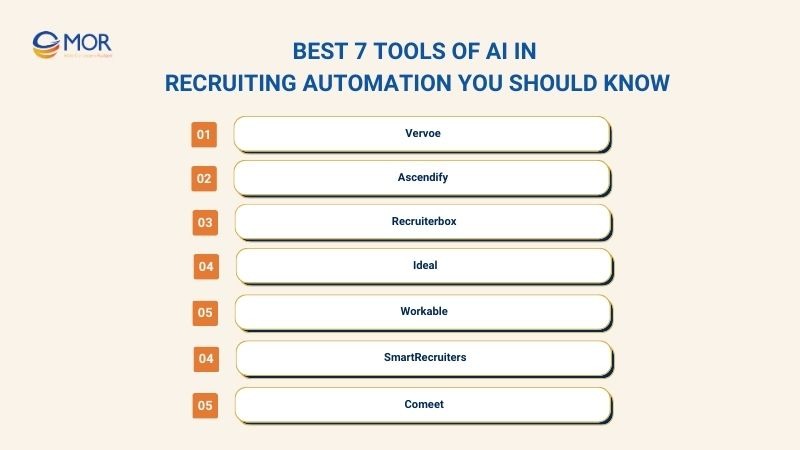
Common Challenges Of AI In Recruitment And Talent Acquisition
Implementing AI in recruitment and AI in talent acquisition offers many benefits but also comes with significant challenges. Here are the common issues that organizations need to address to ensure effective and secure use of AI for recruitment.
Data Privacy and Security Risk
When implementing AI in recruitment, protecting candidate data becomes a major challenge. AI in recruitment software needs to access and process large volumes of sensitive information such as personal details, educational background, work experience, and contact information.
If not properly secured, this data can be leaked, lost, or misused, leading to legal risks and damaging the company’s reputation. Organizations must ensure robust data protection measures, encryption, and strict access controls when using AI for recruitment.
Bias and Discrimination
One of the significant challenges of using AI in recruitment is the risk of bias and discrimination. If the input data is flawed or incomplete, AI algorithms can replicate these patterns and produce unfair hiring outcomes, affecting candidate quality and potentially violating fair recruitment regulations.
Therefore, AI for recruitment must be trained on diverse, transparent data and continuously monitored to eliminate bias.
Lack of Human Touch
Although AI in recruiting automation optimizes processes, the lack of human interaction remains a concern. Candidates may feel the recruitment experience is too mechanical if the entire process relies solely on AI.
Organizations should combine AI in recruitment software with personal touchpoints, such as direct HR interactions or in-person interviews, to enhance the candidate experience. For instance, the company uses AI for automated resume screening but still conducts the first interview face-to-face with HR to maintain human involvement in hiring.
Dependence on Technology
Using AI in talent acquisition brings efficiency but also introduces risks when companies become overly reliant on technology. If the AI system malfunctions, data is corrupted, or algorithms generate incorrect outcomes, the recruitment process may be disrupted or lead to unsuitable hires.
To mitigate this risk, organizations need continuous monitoring and the ability to intervene manually when necessary. Combining AI for recruitment with human evaluation ensures that final hiring decisions remain reliable and flexible.
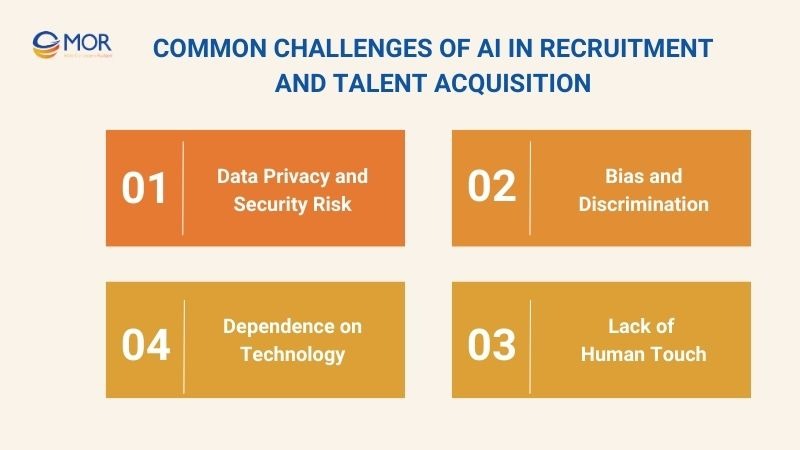
Implement AI In Recruiting Automation With MOR Software Today
MOR Software JSC is a leading software development company in Vietnam, trusted for delivering customized AI and automation solutions that simplify complex business workflows. When it comes to applying AI in recruiting automation, we help organizations eliminate repetitive manual tasks, shorten hiring cycles, and make data-driven decisions without losing the human touch.
Our proven experience includes projects like CareerViet’s Talent Solutions Optimization Initiative, where we built a web-based system to improve recruitment, development, and retention strategies. The solution reduced time-to-hire, improved new hire quality, and enhanced engagement through data-driven insights. By integrating AI-driven automation, CareerViet streamlined candidate evaluation, onboarding, and training while building a healthier workplace culture.
Companies choose MOR Software because we combine technical expertise with practical HR understanding:
- Deep expertise in AI recruitment: We design intelligent solutions that automate resume screening, candidate matching, and workflow optimization to save recruiters time and effort.
- Proven cross-industry success: Our teams have implemented recruitment and HR solutions across finance, manufacturing, healthcare, and human resources platforms.
- Data protection commitment: All systems comply with ISO 27001 and GDPR-equivalent standards to ensure secure candidate data handling.
- Smarter hiring outcomes: AI automation helps recruiters focus on strategic decisions while ensuring consistent and transparent evaluations.
Partner with MOR Software to modernize your recruitment process and deliver measurable results through automation. Contact us to explore how our AI recruiting solutions can transform your HR operations.
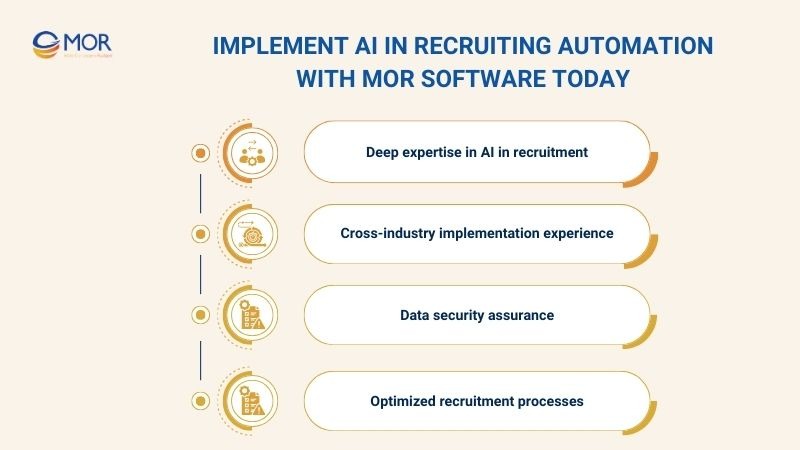
In Conclusion
Adopting AI in recruiting automation has become a strategic necessity for businesses to maintain a competitive advantage in attracting top talent. By partnering with MOR Software, companies can implement customized AI for recruitment solutions that improve hiring quality. Contact us today to start transforming your recruitment workflow and unlock the full potential of your HR strategy!
MOR SOFTWARE
Frequently Asked Questions (FAQs)
How is AI used in recruiting?
AI in recruiting automates repetitive tasks, screens resumes, predicts candidate-job fit, and provides data-driven insights to improve hiring decisions.
When was AI first applied in recruitment?
AI in recruitment was first applied in the 1990s with simple resume parsing and candidate tracking systems, evolving to predictive analytics and intelligent sourcing today.
What is the main goal of AI in recruitment?
The main goal of AI for recruitment is to enhance hiring efficiency, reduce human bias, and improve the quality of candidate selection.
Can AI improve hiring effectiveness?
Yes, AI in recruiting improves hiring effectiveness by automating administrative tasks, providing predictive analytics, and supporting objective candidate evaluation.
Is AI in recruitment biased?
Yes, AI in recruitment can be biased if the training data is flawed or not diverse. Properly curated datasets and continuous monitoring are essential to ensure fair and objective candidate evaluation.
Rate this article
0
over 5.0 based on 0 reviews
Your rating on this news:
Name
*Email
*Write your comment
*Send your comment
1